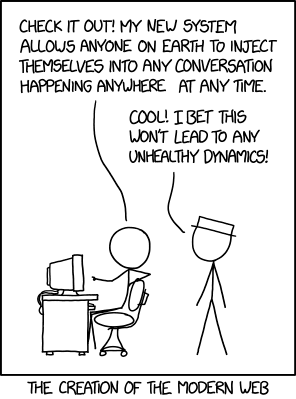From Innovation to Responsibility

Technology is amazing, isn’t it? We’ve gone from smoke signals to social media in what seems like the blink of an eye. However, as the famous saying goes, “with great power comes great responsibility.” It’s crucial that we use technology ethically to avoid any unintended consequences.
A quick definition: Ethical technology is the use of technology in a way that is good for people and the planet. It is about using technology in a way that respects human rights, promotes social justice, and protects the environment. Ethical technology takes into account the potential impact of technology on individuals, society, and the environment. It also considers the ethical implications of the use of technology, such as privacy, security, and bias.
I’m a long-time user and advocate of free and open source software (FOSS), and I believe it’s a great example of an ethical technology. FOSS is built on the principles of transparency and accessibility, which makes it easier for users to understand and modify the code. However, while FOSS can be a great starting point, it’s not a silver bullet solution. It’s important to evaluate software based on its impact and whether it aligns with ethical principles.
One compelling argument for ethical technology is the impact it can have on an organisation’s reputation. People are increasingly concerned about privacy and data protection, and by demonstrating a commitment to ethical practices, organisations can earn their trust and loyalty. On the other hand, if an organisation is caught violating data privacy laws, it could face legal and financial consequences that can damage its reputation.
Another important reason to prioritise ethical technology is the potential impact it can have on the environment. The energy consumption and carbon emissions associated with hosting websites and web services is a significant contributor to climate change. Even a modest website and blog can contribute to the problem. According to a 2020 study by the University of Massachusetts, the internet and its connected devices account for about 3.7% of global greenhouse gas emissions, and this number is expected to grow. By prioritising ethical technology, businesses can reduce their carbon footprint and help mitigate the impact of climate change.
But it’s not all doom and gloom. Ethical technology can be a great way to drive innovation and develop products and services that add value to society. By thinking about the potential social and environmental impacts of your technology, you might come up with some brilliant new ideas that not only make money but also contribute to a better future for everyone. Mozilla is a good example of how ethical technology principles can be used to innovate responsibly. They are committed to making the web a more open, accessible, and secure platform for everyone, while also being mindful of their environmental impact and actively working to mitigate their emissions. (https://wiki.mozilla.org/Projects/Sustainability)
It is crucial to consider the potential risks along with the benefits of the technologies we build. We must be prepared for worst-case scenarios and have plans in place to mitigate them. By taking into account societal and environmental harms, businesses can ensure that they are not only avoiding them, but also spreading best practices. This can lead to increased sales, a better reputation, and reduced costs.
For example, the printing press was a revolutionary invention that helped to spread knowledge and ideas throughout the world. However, it was also used to print propaganda and to incite violence. The internet has made it easier than ever to connect with people from all over the world, but it has also made it easier for people to spread misinformation and to engage in cyberbullying. Despite the negatives, these technologies have been transformational to society and it’s hard to imagine modern life without the Internet.
I fully acknowledge that this can be challenging and costly to implement. Ethical principles are often complex and difficult to apply in the real world, especially when it comes to technology and managing the bottom line. For example, it can be difficult to balance the need for privacy with the need for security. We want to protect our personal information from being used without our consent, but we also want to communicate and share information with others.
I am committed to helping people and organisations use technology better, safer, and more ethically. The tools we build today are like our children. They can be both a source of strength and a source of stress. It is up to us to raise them with care and responsibility. We must use technology to solve problems, not create them. To connect people, not divide them.
Do the right thing and make ethical technology a priority. By doing so, you can build trust, reduce your legal and financial risks, and make a positive impact on society and the environment. And who knows - maybe you’ll come up with the next big thing while you’re at it.